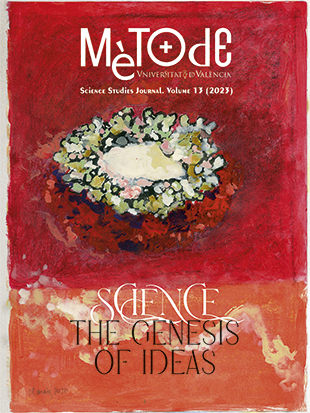Els origens de la normativitat: L’ensenyament 'assessor' i l’aparició de les normes
DOI:
https://doi.org/10.7203/metode.13.21755Paraules clau:
aprenentatge, ensenyament assessor, cultura, cooperació, psicologia normativa Resum
Resum
Les normes regeixen molts aspectes del comportament humà i faciliten la coordinació en les activitats cooperatives. Pel que fa a l’origen de la normativitat, la hipòtesi més acceptada sosté que ha estat modelada per processos de selecció cultural entre grups humans que posseïen diferents normes sobre com organitzar la vida social. Falta, en la nostra opinió, una explicació evolutiva que permeta rastrejar els orígens d’aquesta normativitat incipient que posseïen els primers humans. En aquest article suggerim que la dimensió normativa va aparèixer prompte, en els nostres avantpassats hominins, com una conseqüència del desenvolupament de capacitats elementals per a l’ensenyament, entès aquest no sols com l’habilitat per a mostrar com es fa alguna cosa, sinó també com l’habilitat d’assenyalar què es pot o no fer.
 Descàrregues
Descàrregues
 Referències
Referències
Birch, J. (2021). Toolmaking and the evolution of normative cognition. Biology & Philosophy, 36, 4. https://doi.org/10.1007/s10539-020-09777-9
Brandom, R. (1994). Making it explicit: Reasoning, representing, and discursive commitment. Harvard University Press.
Castro L., Castro-Nogueira, L., Castro-Nogueira, M. A., & Toro, M. A. (2010). Cultural transmission and social control of human behavior. Biology and Philosophy, 25, 347–360. https://doi.org/10.1007/s10539-010-9201-y
Castro, L., Castro-Nogueira, M. A., Villarroel, M., & Toro, M. A. (2019). The role of assessor teaching in human culture. Biological Theory, 14, 112–121. https://doi.org/10.1007/s13752-018-00314-2
Castro, L., Castro-Nogueira, M. A., Villarroel, M., & Toro, M. A. (2021). Assessor teaching and the evolution of human morality. Biological Theory, 16, 5–15. https://doi.org/10.1007/s13752-020-00362-7
Castro, L., & Toro, M. A. (2004). The evolution of culture: From primate social learning to human culture. Proceedings of the National Academy of Sciences, 101, 10235–10240. https://doi.org/10.1073/pnas.0400156101
Chudek, M., & Henrich, J. (2011). Culture-gene coevolution, norm-psychology and the emergence of human prosociality. Trends in Cognitive Sciences, 15(5), 218–226. https://doi.org/10.1016/j.tics.2011.03.003
Henrich, J. (2015). The secret of our success: How culture is driving human evolution, domesticating our species, and making us smarter. Princeton University Press.
Peregrin, J. (2014). Rules as the impetus of cultural evolution. Topoi, 33, 531–545. https://doi.org/10.1007/s11245-013-9219-2
Premack, D. (2007). Human and animal cognition: Continuity and discontinuity. Proceedings of the National Academy of Sciences, 104(35), 13861–13867. https://doi.org/10.1073/pnas.0706147104
Richerson, P. J., & Boyd, R. (2005). Not by genes alone. University of Chicago Press.
Schmidt, M. F., Butler, L. P., Heinz, J., & Tomasello, M. (2016). Young children see a single action and infer a social norm: Promiscuous normativity in 3-year-olds. Psychological Science, 27(10), 1360–1370. https://doi.org/10.1177/0956797616661182
Shipton, C., & Nielsen, M. (2018). The acquisition of biface knapping skill in the Acheulean. In L. D. di Paolo, F. di Vincenzo, & F. de Petrillo (Eds.), Evolution of primate social cognition (pp. 283–297). Springer. https://doi.org/10.1007/978-3-319-93776-2_18
Sripada, C. S., & Stich, S. (2007). A framework for the psychology of norms. In P. Carruthers, S. Laurence, & S. Stich (Eds.), The innate mind, Volume 2: Culture and cognition. Oxford University Press.
Tomasello, M. (2014). A natural history of human thinking. Harvard University Press.
Descàrregues
Arxius addicionals
Publicades
Com citar
-
Resum1484
-
PDF 635
-
Cover letter de Laureano Castro y Miguel Toro (Español)4
Número
Secció
Llicència
![]()
Tots els documents inclosos en OJS són d'accés lliure i propietat dels seus autors.
Els autors que publiquen en aquesta revista estan d'acord amb els següents termes:
- Els autors conserven els drets d'autor i garanteixen a la revista el dret a la primera publicació del treball, llicenciat baix una llicència de Reconeixement-NoComercial-SenseObraDerivada 4.0 Internacional de Creative Commons, que permet a altres compartir el treball amb un reconeixement de l'autoria del treball i citant la publicació inicial en aquesta revista.
- Es permet i s'anima els autors a difondre la versió definitiva dels seus treballs electrònicament a través de pàgines personals i institucionals (repositoris institucionals, pàgines web personals o perfils a xarxes professionals o acadèmiques) una vegada publicat el treball.





